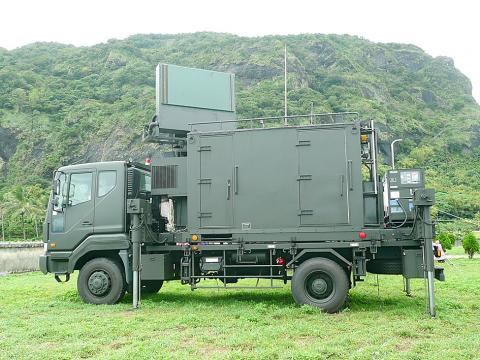As the Chinese People’s Liberation Army Air Force (PLAAF) deploys J-20 stealth fighters in increasing numbers, Taiwan is fielding mobile passive radar systems to defend its airspace against stealth aircraft, a senior Ministry of National Defense official said.
Two radar units — developed by the ministry-affiliated Chungshan Institute of Science and Technology — would be deployed some time this year for operational testing, the officials said on condition of anonymity.
The system would enter mass production in 2020 if the military decides that it meets its operational needs, he said.

Photo copied from the Chungshan Institute of Science and Technology’s Web site
The institute has been working for years to incorporate Western military technological trends in its mobile passive radar system, the official added.
The military’s concept for counter-stealth air defense is comprised of active and passive systems, which would detect, track and lock on to stealth targets at long range, the official said.
The active means would consist of upgraded F-16 warplanes, which have advanced radar systems capable of detecting stealth aircraft, he said, referring to F-16V aircraft and the APG-83 Scalable Agile Beam Radar.
The radar systems would comprise the passive end of the system, the official said.
The mobile units will be remotely linked to active phased array radar systems and “magnify” the radar cross-section of detected objects without emitting radiation, he said.
They are less vulnerable to electronic warfare interference and anti-radiation missile attacks, a fact sheet published by the institute said.
China claims that the J-20, its indigenous stealth strike fighter, performs on a par with the US’ F-22 Raptor, the official said, adding that the jet is likely capable of attacking targets at sea.
The radar systems are a response to the threat posed by Chinese stealth fighters, including its modified Su-35 fighters, which the PLAAF has been coating with radiation-absorbing paint to give them a measure of stealth, he said.
While the J-20 is in limited service, there is no doubt that the PLAAF will increase the size of its stealth fighter fleet and supplement it with other warplanes, which would pose a significant threat to Taiwan’s air defense, he said.
“These developments will erode the detection range of our advanced warning radar systems or even lead to the complete loss of advanced warning and quick reaction capabilities,” he said. “The military must plan for and deploy countermeasures to preempt them.”
The PLAAF on Friday last week dispatched formations of Su-35 fighters and H-6K bombers to fly around Taiwan, the first time that the former was sent on such a patrol.
The Chinese military claims that the J-20 has been deployed in air combat drills at sea.

MAKING WAVES: China’s maritime militia could become a nontraditional threat in war, clogging up shipping lanes to prevent US or Japanese intervention, a report said About 1,900 Chinese ships flying flags of convenience and fishing vessels that participated in China’s military exercises around Taiwan last month and in January last year have been listed for monitoring, Coast Guard Administration (CGA) Deputy Director-General Hsieh Ching-chin (謝慶欽) said yesterday. Following amendments to the Commercial Port Act (商港法) and the Law of Ships (船舶法) last month, the CGA can designate possible berthing areas or deny ports of call for vessels suspected of loitering around areas where undersea cables can be accessed, Oceans Affairs Council Minister Kuan Bi-ling (管碧玲) said. The list of suspected ships, originally 300, had risen to about

DAREDEVIL: Honnold said it had always been a dream of his to climb Taipei 101, while a Netflix producer said the skyscraper was ‘a real icon of this country’ US climber Alex Honnold yesterday took on Taiwan’s tallest building, becoming the first person to scale Taipei 101 without a rope, harness or safety net. Hundreds of spectators gathered at the base of the 101-story skyscraper to watch Honnold, 40, embark on his daredevil feat, which was also broadcast live on Netflix. Dressed in a red T-shirt and yellow custom-made climbing shoes, Honnold swiftly moved up the southeast face of the glass and steel building. At one point, he stepped onto a platform midway up to wave down at fans and onlookers who were taking photos. People watching from inside

Japan’s strategic alliance with the US would collapse if Tokyo were to turn away from a conflict in Taiwan, Japanese Prime Minister Sanae Takaichi said yesterday, but distanced herself from previous comments that suggested a possible military response in such an event. Takaichi expressed her latest views on a nationally broadcast TV program late on Monday, where an opposition party leader criticized her for igniting tensions with China with the earlier remarks. Ties between Japan and China have sunk to the worst level in years after Takaichi said in November that a hypothetical Chinese attack on Taiwan could bring about a Japanese

The WHO ignored early COVID-19 warnings from Taiwan, US Deputy Secretary of Health and Human Services Jim O’Neill said on Friday, as part of justification for Washington withdrawing from the global health body. US Secretary of State Marco Rubio on Thursday said that the US was pulling out of the UN agency, as it failed to fulfill its responsibilities during the COVID-19 pandemic. The WHO “ignored early COVID warnings from Taiwan in 2019 by pretending Taiwan did not exist, O’Neill wrote on X on Friday, Taiwan time. “It ignored rigorous science and promoted lockdowns.” The US will “continue international coordination on infectious